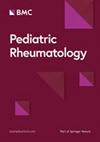治疗甲羟戊酸激酶缺乏症和 TNF 受体相关周期性综合征的托珠单抗:病例系列和文献综述
IF 2.8
3区 医学
Q1 PEDIATRICS
引用次数: 0
摘要
甲羟戊酸激酶缺乏症(MKD)和TNF受体相关周期性综合征(TRAPS)属于系统性自身炎症性疾病(SAIDs),是一种罕见疾病,具有发病早、病情重、诊断和治疗难度大等特点。虽然不同的SAIDs有不同的标准治疗方法,但有些SAIDs在常规治疗后控制不佳,严重影响儿童的生长发育和生活质量。本研究旨在为SAID提供更多的治疗策略。我们介绍了两名对TNF-(肿瘤坏死因子)α阻断治疗耐药的中国MKD和TRAPS患者。在使用依那西普、巴利替尼和糖皮质激素后,MKD 和 TRAPS 患者仍有周期性发热和皮疹。由于中国大陆没有IL-1拮抗剂,我们开始静脉注射托西珠单抗(TCZ),剂量为每三周一次,每次240毫克。他们在接受一至两次 TCZ 治疗后未出现发热或皮疹。MKD患者接受TCZ治疗前,白细胞(WBC)计数和TNF-α水平正常,红细胞沉降率(ESR)和C反应蛋白(CRP)显著升高,IL-6略有升高。接受TCZ治疗后,ESR和CRP水平恢复正常,但IL-6偶有升高。TRAPS患者的血沉、CRP、白细胞、IL-6和TNF-α水平明显升高。TCZ 治疗后,ESR、CRP、WBC、IL-6 和 TNF-α 水平恢复正常。这两名患者接受TCZ治疗6个多月后,临床和血清学症状均得到缓解。此外,他们在注射TCZ后没有出现不良反应。在中国大陆缺乏IL-1拮抗剂的情况下,托珠单抗成为治疗对TNF-α阻断耐药的SAID的替代药物。本文章由计算机程序翻译,如有差异,请以英文原文为准。
Tocilizumab for treating mevalonate kinase deficiency and TNF receptor-associated periodic syndrome: a case series and literature review
Mevalonate kinase deficiency (MKD) and TNF receptor-associated periodic syndrome (TRAPS) are categorized as systemic autoinflammatory diseases (SAIDs), which are rare diseases characterized by early onset, severe conditions, and challenging diagnosis and treatment. Although different SAIDs have varying standard treatments, some SAIDs are poorly controlled after routine treatment, seriously affecting the growth and development of children and their quality of life. This study aims to provide more treatment strategies for SAIDs. We present two Chinese patients with MKD and TRAPS who were resistant to TNF- (tumor necrosis factor-) α blockade. After using etanercept, baricitinib, and glucocorticoid, patients with MKD and TRAPS still had periodic fever and rash. Due to the unavailability of IL-1 antagonists in the Chinese Mainland, we started administering intravenous tocilizumab (TCZ) at a dosage of 240 mg every three weeks. They had not experienced fever or rash after receiving one or two doses of TCZ. Before treatment with TCZ in the MKD patient, white blood cell (WBC) count, and TNF-α level were normal, erythrocyte sedimentation rate (ESR) and C-reactive protein (CRP) increased significantly, and IL-6 increased slightly. After treatment with TCZ, ESR and CRP levels returned to normal; however, IL-6 increased occasionally. In the TRAPS patient, ESR, CRP, WBC, IL-6, and TNF-α levels were increased significantly. After TCZ treatment, ESR, CRP, WBC, IL-6, and TNF-α levels returned to normal. The two patients were treated with TCZ for more than six months and achieved clinical and serological remission. Furthermore, they had no adverse reactions after injection of TCZ. In the absence of IL-1 antagonists in mainland China, tocilizumab emerges as an alternative drug in SAIDs that are resistant to TNF-α blockade.
求助全文
通过发布文献求助,成功后即可免费获取论文全文。
去求助
来源期刊

Pediatric Rheumatology
PEDIATRICS-RHEUMATOLOGY
CiteScore
4.10
自引率
8.00%
发文量
95
审稿时长
>12 weeks
期刊介绍:
Pediatric Rheumatology is an open access, peer-reviewed, online journal encompassing all aspects of clinical and basic research related to pediatric rheumatology and allied subjects.
The journal’s scope of diseases and syndromes include musculoskeletal pain syndromes, rheumatic fever and post-streptococcal syndromes, juvenile idiopathic arthritis, systemic lupus erythematosus, juvenile dermatomyositis, local and systemic scleroderma, Kawasaki disease, Henoch-Schonlein purpura and other vasculitides, sarcoidosis, inherited musculoskeletal syndromes, autoinflammatory syndromes, and others.
 求助内容:
求助内容: 应助结果提醒方式:
应助结果提醒方式:


